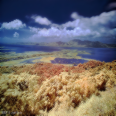

  |
|
ローマ人にも、Braggadocio や Rodomontのような考えがあった。そ れは、テレンティウスの戯曲「宦官(The Eunuch)」に登場する威張り散 らす軍人タルーソである。彼は、ワトソン博士が「自惚れと法螺(brag and bounce)」と呼んでいたそのままの人であった。シェイクスピアの 「お気に召すまま」では、ロザリンド(Rosalind)が、カエサル(シーザー) のタルーソのような高慢な言葉(thrasonical brag)「来た、見た、勝った (I came, I saw, I overcame.)」について言及している。」 では、今回はこれです。 「UTOPIAN In 1516 Sir Thomas More wrote a book about an ideal state. Book and place bore the title Utopia, which means No Place. (U is from ou, a Greek negative, and top is from topos, place.) When, 250 years later, Samuel Butler wrote his novel of another utopia, he sought another disguise. He just spelled the word "nowhere" backwards and called his book Erewhon. Utopian is a synonym for quixotic; it carries the idea of impractical, unfeasible, impossible visionary, chimerical, ideal but unattainable.」
不者=そうでなけえば、そうしなければ、「者」は「ときには、場合 には」を意味する。 火患=火災 不應=応答・返事をしない 居無幾何=いくらも日がたたぬうちに。日時の経過を示すときに「居」 の字を用いる。例えば「居三日」は「三日たって」、また「居常」は「平 生・平常」の意味。 郷聚里中人=「村の人」を意味する。 哀=気の毒がる 息=やむ
 
|
|
|